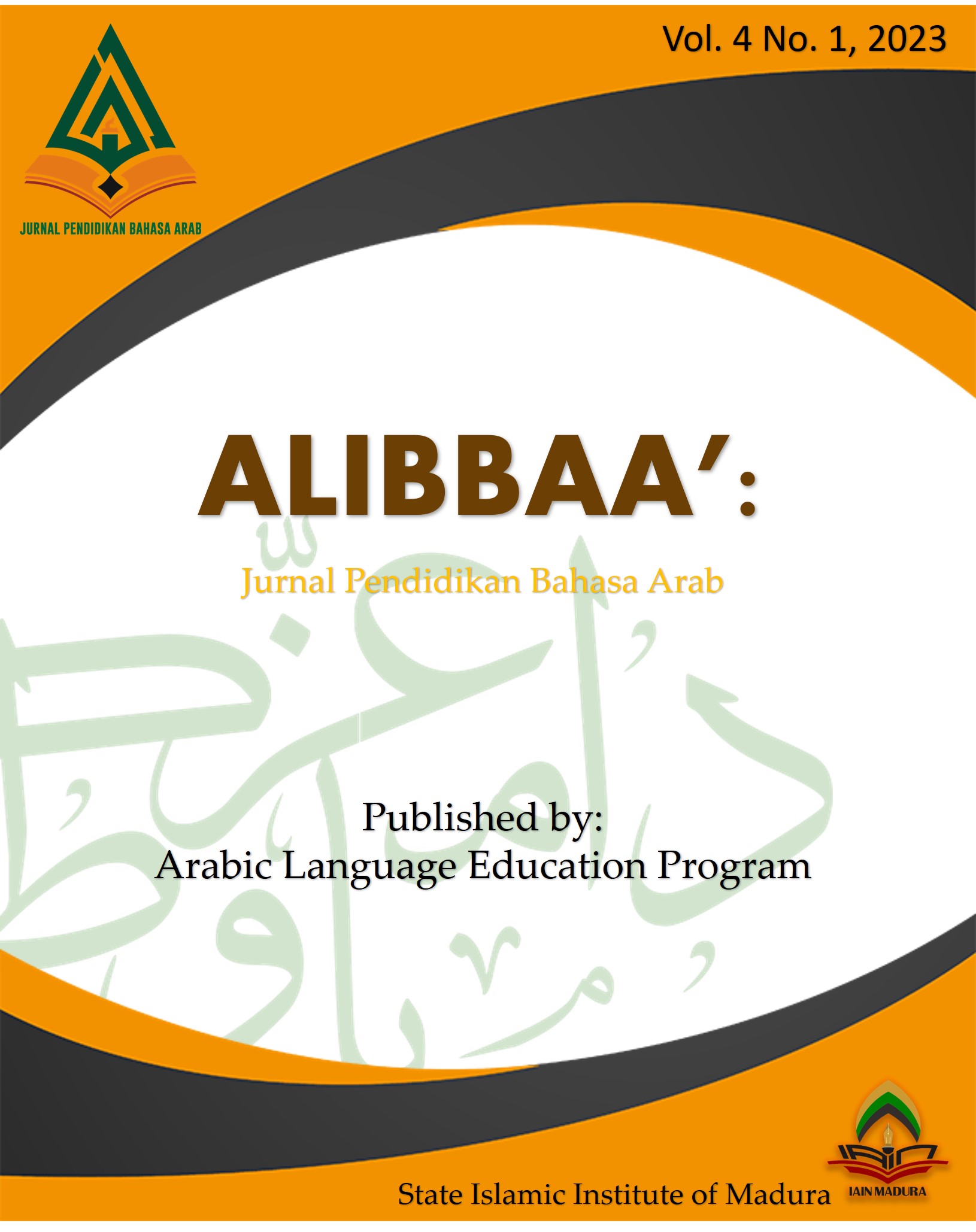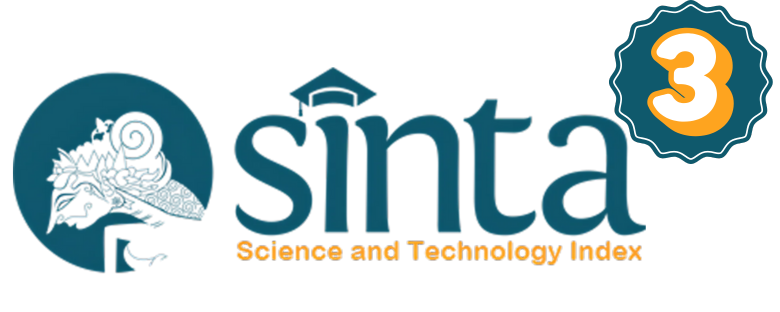Manajemen Perencanaan dan Pengorganisasian Pembelajaran Bahasa Arab
 Abstract views: 2278
,
Abstract views: 2278
,
 pdf downloads: 2345
pdf downloads: 2345
Abstract
The purpose of this study was to determine the management of planning and organizing Arabic language learning at Amal Jama'i Islamic Boarding Schools, as well as to determine the supporting and inhibiting factors in learning Arabic. The research method used in this study is a descriptive qualitative method. Data collection techniques were carried out by interviews and observations with descriptive data analysis techniques in accordance with Miles and Huberman's theory. The results of this study show that: 1) The planning management in learning Arabic is carried out by establishing Arabic learning programs, preparing learning materials, and determining relevant learning media, 2) The organizing management in learning Arabic begins with the division of teaching tasks, then the preparation of lesson schedules, as well as the provision of learning facilities, 3) Several supporting factors for learning Arabic include support from the headmaster of the college, the existence of a language division, and the stipulation of Arabic days of the week, while the inhibiting factors are inadequate time allocation, lack of human resources and environmental influences. The results of this study can be used as a reference for Arabic language activist researchers and academics.
Downloads
References
Akbar, Ghufran, and Bambang Budi Prasetyo. “Manajemen Pengorganisasian Program Kursus Bahasa Arab Di Akademik Almadinah.” Taqdir 8, no. 1 (2022). https://doi.org/10.19109/taqdir.v8i1.9150.
Akbari, M. Afief, and Satriadi Satriadi. “Manajemen Perencanaan Pembelajaran Bahasa Arab Di MTSN 4 Tanjung Jabung Timur Jambi.” Shaut al Arabiyyah 9, no. 2 (2021) https://doi.org/10.24252/saa.v9i2.24174.
Djumingin, Sulastriningsih. PERENCANAAN PEMBELAJARAN BAHASA, SASTRA INDONESIA DAN DAERAH Teori dan Penerapannya. 2nd ed. Makassar: Penerbit UNM, 2016. http://eprints.unm.ac.id/id/eprint/8410.
Farhad. “Manajemen Pembelajaran Bahasa Arab (Studi Kasus Di Madrasah Aliyah Al Kahfi Bogor).” Raayah Al-Islam: Jurnal Ilmu Islam 5, no. 2 (2021) https://doi.org/10.37274/rais.v5i02.487.
Handoko, T Hani. Manajemen. Yogyakarta: BPFE, 1998.
Ninoersy, Tarmizi, ZA Tabrani, and Najmul Wathan. “Manajemen Perencanaan Pembelajaran Bahasa Arab Berbasis Kurikulum 2013 Pada SMAN 1 Aceh Barat.” FITRAH: Jurnal Kajian Ilmu-ilmu Keislaman 5, no. 1 (2019) http://dx.doi.org/10.24952/fitrah.v5i1.1759.
Rahmah, Ulfah Fauziyah. “Program Pembelajaran Bahasa Arab Di SMP Plus Al-Aqsha Jatinagor Sumedang.” An Nabighoh: Jurnal Pendidikan dan Pembelajaran Bahasa Arab 21, no. 02 (2019) https://doi.org/10.32332/an-nabighoh.v21i02.1680.
Rohhani, Imam, and Istikomah Istikomah. “IMPLEMENTASI PERENCANAAN PEMBELAJARAN DI KURSUS BAHASA ARAB AL-IMAN SURABAYA.” Idaarah: Jurnal Manajemen Pendidikan 5, no. 2 (2021) https://doi.org/10.24252/idaarah.v5i2.20884.
Rosyid, Muhammad Kholilur, Moch Sulthoni Faizin, Nazahah Ulin Nuha, and Zakiyah Arifa. “Manajemen Perencanaan Pembelajaran Aktif Di Lembaga Kursus Bahasa Arab Al-Azhar Pare Kediri.” LISANIA: Journal of Arabic Education and Literature 3, no. 1 (2019) https://doi.org/10.18326/lisania.v3i1.1-20.
Rukajat, Ajat. Manajemen Pembelajaran. Deepublish, 2018.
Sandu Siyoto, and M. Ali Sodik. “Dasar Metodologi Penelitian Dr. Sandu Siyoto, SKM, M.Kes M. Ali Sodik, M.A. 1.” Dasar Metodologi Penelitian (2015): 1–109.
Styabudi, Wahyu. “Manajemen Program Pembelajaran Bahasa Arab Di Pondok Pesantren Darussalam: Studi Kasus Di Pondok Pesantren Darussalam Ngesong-Sengon Jombang.” PhD Thesis, Universitas Islam Negeri Maulana Malik Ibrahim, 2017. http://etheses.uin-malang.ac.id/12492/.
Syaifudin, Syaifudin, Masykur Hasan, Ilzam Naufal, M Habib Ihsanudin, and Azmi Abdillah Agustian. “Manajemen Pesantren Dalam Menerapkan Bahasa Arab Di Pondok Modern Darussalam Gontor Kampus 7 Kalianda Lampung Selatan.” Islamic Management: Jurnal Manajemen Pendidikan Islam 5, no. 02 (2022) http://dx.doi.org/10.30868/im.v5i2.3004.
Syukran, Muhammad, Andi Agustang, Andi Muhammad Idkhan, and Rifdan Rifdan. “KONSEP ORGANISASI DAN PENGORGANISASIAN DALAM PERWUJUDAN KEPENTINGAN MANUSIA.” Publik: Jurnal Manajemen Sumber Daya Manusia, Administrasi dan Pelayanan Publik 9, no. 1 (2022) https://doi.org/10.37606/publik.v9i1.277.
Thalib, Mohamad Anwar. “PELATIHAN ANALISIS DATA MODEL MILES DAN HUBERMAN UNTUK RISET AKUNTANSI BUDAYA.” Madani: Jurnal Pengabdian Ilmiah 5, no. 1 (2022) https://doi.org/10.30603/md.v5i1.2581.
Umam, Islahel, Moh. Hasin, and Zakiyah Arifa. “Manajemen Pengorganisasian Program Kursus Markaz Bahasa Arab Darul Lughah Waddirasat Islamiyah.” An Nabighoh: Jurnal Pendidikan dan Pembelajaran Bahasa Arab 21, no. 01 (2019) https://doi.org/10.32332/an-nabighoh.v21i01.1376.
Umi Rahmawati, Dwi Nur, and Ratna Dewi Puspita. “Penerapan Manajemen Pembelajaran Di Sekolah Dasar Selama Pandemi.” PRODU: Prokurasi Edukasi Jurnal Manajemen Pendidikan Islam 2, no. 1 (2020) https://doi.org/10.15548/p-prokurasi.v2i1.2051.
Authors who publish with this journal agree to the following terms:
a. Authors retain copyright and grant the journal right of first publication with the work simultaneously licensed under a Creative Commons Attribution License that allows others to share the work with an acknowledgement of the work's authorship and initial publication in this journal.
b. Authors are able to enter into separate, additional contractual arrangements for the non-exclusive distribution of the journal's published version of the work (e.g., post it to an institutional repository or publish it in a book), with an acknowledgement of its initial publication in this journal.
c. Authors are permitted and encouraged to post their work online (e.g., in institutional repositories or on their website) prior to and during the submission process, as it can lead to productive exchanges, as well as earlier and greater citation of published work (See The Effect of Open Access).
Alibbaa': Jurnal Pendidikan Bahasa Arab have CC-BY-SA or an equivalent license as the optimal license for the publication, distribution, use, and reuse of scholarly work.
In developing strategy and setting priorities, Alibbaa': Jurnal Pendidikan Bahasa Arab recognize that free access is better than priced access, libre access is better than free access, and libre under CC-BY-SA or the equivalent is better than libre under more restrictive open licenses. We should achieve what we can when we can. We should not delay achieving free in order to achieve libre, and we should not stop with free when we can achieve libre.

Alibbaa': Jurnal Pendidikan Bahasa Arab is licensed under a Creative Commons Attribution 4.0 International License
You are free to:
- Share — copy and redistribute the material in any medium or format
- Adapt — remix, transform, and build upon the material for any purpose, even commercially.
- The licensor cannot revoke these freedoms as long as you follow the license terms.











